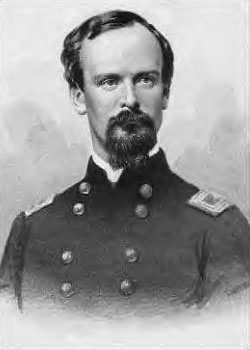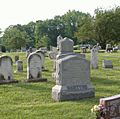Stephen G. Burbridge facts for kids
Quick facts for kids
Stephen Gano Burbridge
|
|
|---|---|

Major General Stephen G. Burbridge
|
|
| Nickname(s) | "Butcher" Burbridge, "Butcher of Kentucky" |
| Born | August 19, 1831 Georgetown, Kentucky |
| Died | December 2, 1894 (aged 63) Brooklyn, New York |
| Place of burial | |
| Allegiance | United States Union |
| Service/ |
United States Army Union Army |
| Years of service | 1861–1865 |
| Rank | |
| Commands held | 26th Kentucky Infantry Regiment 1st Brigade, 1st Division, XIII Corps District of Kentucky |
| Battles/wars | American Civil War - Battle of Shiloh - Battle of Fort Hindman - Battle of Champion Hill - Bayou Teche Campaign - Battle of Bayou Bourbeux - Battle of Mt. Sterling - Battle of Cynthiana - Battle of Saltville I |
| Signature | |
Stephen Gano Burbridge (born August 19, 1831 – died December 2, 1894) was a Union general during the American Civil War. He was sometimes called "Butcher" Burbridge or the "Butcher of Kentucky". This nickname came from his strict actions while he was in charge of Kentucky. In 1864, he was given command of Kentucky to stop attacks by Confederate guerrillas. He put the state under martial law, which meant military rules were in charge. Some people criticized him for how he dealt with those accused of being guerrillas.
Contents
Early Life and Career
Stephen Gano Burbridge was born in Georgetown, Kentucky, on August 19, 1831. He went to Georgetown College and the Kentucky Military Institute. After finishing school, he trained to become a lawyer. He also owned a large farm.
Serving in the Civil War
When the American Civil War began, Burbridge helped create the 26th Kentucky Infantry Regiment. He joined the Union Army as the colonel, or leader, of this regiment.
Command in Kentucky
After leading troops in several battles, Burbridge won the Battle of Cynthiana against Confederate forces. In June 1864, he was put in charge of the District of Kentucky. His main job was to stop the growing problem of Confederate guerrilla attacks. President Abraham Lincoln allowed Burbridge to declare martial law in Kentucky. This meant the military took control of the state. Some people in Kentucky felt like their state was under military attack during this time.
On July 16, 1864, Burbridge issued a special order called Order No. 59. This order stated that if an unarmed Union citizen was killed, several captured guerrillas would be executed in response. During his time in charge, many people were arrested and some were executed. These people were accused of serious crimes like treason. However, his opponents said that many of these accusations were not true.
Battle of Saltville
While still in charge of Kentucky, Burbridge led Union attacks in October 1864. These attacks were aimed at salt-making factories near Saltville, Virginia. This event was part of the first Battle of Saltville. His attack was not successful. Among his soldiers were African American cavalry troops. These troops later became the 5th United States Colored Cavalry Regiment.
After the battle, some wounded African American soldiers were killed by Confederate soldiers and guerrillas. Others were killed while being treated at a hospital. These sad events became known as the Saltville Massacre.
Political Actions
During the 1864 presidential election, Burbridge tried to help President Lincoln get re-elected. He did this by trying to stop support for Lincoln's opponent, George B. McClellan, in Kentucky. He even arrested important people who supported McClellan. These included Lieutenant Governor Richard Taylor Jacob and Judge Bullitt, both of whom he sent out of the state.
Dismissal from Command
Burbridge had disagreements with Governor Thomas E. Bramlette. In February 1865, Burbridge tried to take control of the governor's troops and weapons. Because of these issues, President Lincoln removed Burbridge from his command in Kentucky. Lincoln also canceled Burbridge's controversial order. Major General John Palmer took over Burbridge's role. Soon after, Burbridge left the army.
Later Years
After the war ended, Stephen Burbridge moved to Brooklyn, New York. He passed away there on December 2, 1894. He is buried at Arlington National Cemetery.
Images for kids
-
Image of the Confederate Martyrs Monument in Jeffersontown, Kentucky for the four Confederate soldiers executed by Burbridge
-
Confederate Soldiers Martyrs Monument in Eminence of Eminence, Kentucky for the three Confederate soldiers executed by order of General Burbridge
-
Bust of Burbridge at Vicksburg National Military Park
See also
 | Toni Morrison |
 | Barack Obama |
 | Martin Luther King Jr. |
 | Ralph Bunche |





